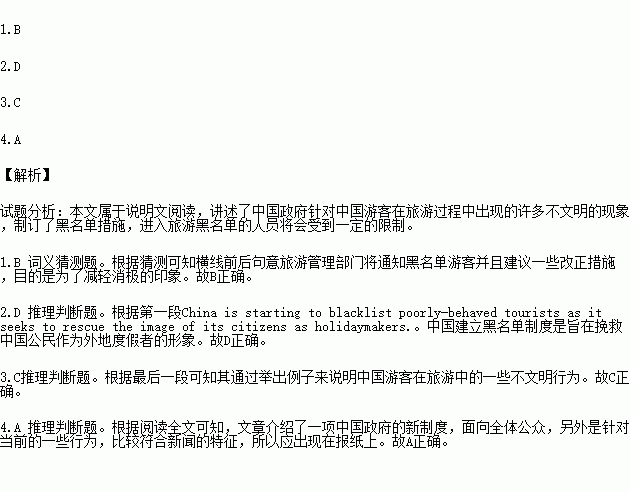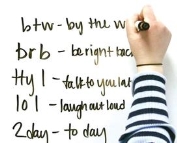题目内容
China is starting to blacklist poorly-behaved tourists as it seeks to rescue the image of its citizens as holidaymakers.
According to a regulation by the China National Tourism Administration (NTA) that entered effect this week, tourists will be blacklisted for offences including acting antisocially on public transport, damaging private or public property, disrespecting local customs, damaging historical exhibits on purpose or engaging in gambling or pornographic activities. Records will be kept in a two-tired system: provincial-level tourism authorities are responsible for cases under their jurisdiction(管辖区域)while the NTA will be in charge of a nationwide register. People will be .blacklisted for two years after they offend, according to the regulation.
The NTA said tourism authorities will inform blacklisted tourists and “propose correction measures in order to mitigate the negative impact”. It also said that tourism authorities reserve the right to report such violations to public security, customs and transport authorities as well as the central bank’s individual credit department.
The regulation comes amid (在……之中) growing concern about the ill manners of Chinese tourists both at home and abroad. In 2013, a Chinese tourist wrote his name on a relief carving in Luxor, Egypt. In December, a Chinese passenger threw a cup of hot instant noodles at a flight attendant on an international flight. Chinese tourists have been fined or put into prison for carrying prohibited items or purchasing wild animal products.
1.The underlined word “mitigate” in the third paragraph probably means ________.
A. neglect B. relieve C. deepens D. prevents
2.According to the passage, the main purpose of the regulation is to ________.
A. punish the Chinese poorly-behaved tourists
B. suggest correct measures to the Chinese poorly-behaved tourists
C. showcase the authority of the China National Tourism Administration (NTA)
D. better the image of Chinese citizens as holidaymakers
3.The main method the author uses to develop the last paragraph is ________.
A. providing explanations
B. offering analyses
C. giving examples
D. making comparisons
4.The text is most likely to appear in ________.
A. a newspaper B. a tourist guide
C. a travel brochure D. a geography textbook


 ),并在其下面写出该加的词。
),并在其下面写出该加的词。